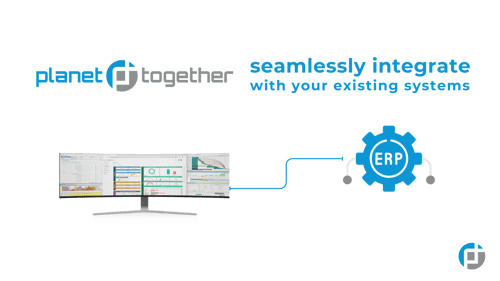Ensuring Resilient Operations in Chemical Manufacturing: The Role of Advanced Planning and Integration
In the industrial landscape, Plant Managers in chemical manufacturing facilities face a challenging mandate—ensure operational continuity and resilience in the face of supply chain disruptions, fluctuating demand, energy constraints, regulatory pressures, and workforce limitations.
While lean manufacturing principles have long driven efficiency, recent global events have underscored the need for a more resilient operational model—one that doesn’t just reduce waste but adapts to uncertainty, safeguards productivity, and accelerates recovery.
At the heart of resilient operations lies digital integration—and one of the most transformative enablers in this domain is Advanced Planning and Scheduling (APS) systems like PlanetTogether, especially when integrated with ERP, MES, and supply chain platforms like SAP, Oracle, Microsoft Dynamics, Kinaxis, or Aveva.
Let’s explore how Chemical Plant Managers can leverage these tools to build smarter, faster, and more resilient operations.
What Does Operational Resilience Really Mean for Chemical Manufacturing?
Operational resilience in chemical manufacturing goes beyond disaster recovery. It means:
Maintaining production performance despite raw material shortages or delivery delays.
Adjusting schedules dynamically when utilities, equipment, or labor resources change unexpectedly.
Meeting strict compliance and safety standards even during times of stress.
Minimizing downtime while maximizing asset and batch utilization.
Responding quickly to customer or regulatory shifts without disrupting long-term planning.
Resilience, in short, is about being agile without being chaotic.
Common Barriers to Resilient Operations in Chemical Plants
Before discussing solutions, it's important to understand the real-world obstacles:
Siloed Data Systems
Production, procurement, inventory, and logistics often operate in disconnected systems, making real-time decision-making difficult.
Complex Recipes and Batch Dependencies
Chemical manufacturing involves intricate, multi-step processes, making rescheduling or reallocation a technical and regulatory minefield.
Limited Visibility into Constraints
From equipment maintenance to utility availability (e.g., steam, cooling, power), many factors can restrict operations without advanced notice.
Reactive Rather than Proactive Scheduling
Traditional scheduling tools lack the intelligence to simulate, predict, and optimize, leading to fire-fighting instead of planning.
Inflexible ERP Systems Alone
ERPs like SAP or Oracle are powerful in managing static data but often lack the dynamic responsiveness needed for fast-changing shop floor conditions.

The Power of APS: Why Plant Managers Are Turning to PlanetTogether
PlanetTogether APS has emerged as a go-to platform for chemical manufacturers aiming to increase resilience without sacrificing performance. Here’s why:
Real-Time Schedule Optimization
PlanetTogether enables real-time, constraint-based scheduling that accounts for:
Equipment capacity
Changeover times
Workforce shifts
Material availability
Maintenance plans
This allows Plant Managers to generate optimal production schedules that flex with current realities.
What-If Scenario Planning
What if a key raw material is delayed? What if a line goes down for maintenance? What if an order suddenly gets expedited?
PlanetTogether enables the creation of "what-if" simulations that show the impact of these scenarios—allowing you to make informed, fast decisions before chaos hits.
Multi-Plant and Multi-Line Visibility
For plants managing several production lines or coordinating with other sites, PlanetTogether’s centralized view allows for cross-site optimization, balancing loads, and minimizing bottlenecks.

Why Integration Is the Secret Weapon
While PlanetTogether is powerful on its own, its real strength is unleashed when integrated with your existing digital ecosystem—ERP, MES, and supply chain platforms.
Let’s break this down:
SAP + PlanetTogether
With SAP ERP managing your inventory, procurement, and order management, integrating with PlanetTogether ensures that real-time inventory and demand signals automatically feed into scheduling.
The result? Your plant schedule is always aligned with the latest order priorities, material availability, and delivery dates—without manual data shuffling.
Oracle + PlanetTogether
Oracle’s SCM and ERP capabilities are strong in finance and operations planning. PlanetTogether adds a critical execution layer, bringing operational agility to Oracle's strategic view. Changes in customer orders or production variances can be managed seamlessly.
Microsoft Dynamics + PlanetTogether
Dynamics users benefit from PlanetTogether's easy integration via open APIs. Schedule changes can be automatically pushed to Dynamics for real-time updates on expected delivery dates, material needs, and labor allocations—boosting cross-departmental alignment.
Kinaxis + PlanetTogether
Kinaxis is known for its demand planning and supply chain responsiveness. When integrated with PlanetTogether, you gain end-to-end planning from supply chain to shop floor. A spike in demand? Your schedule adjusts. A supplier delay? The plant’s work order flow is reshaped in minutes.
Aveva + PlanetTogether
Aveva’s MES and production monitoring tools are widely used in process industries. By integrating with PlanetTogether, you bridge the gap between monitoring and execution—turning real-time production data into optimized production sequences automatically.
Real-World Impact: Resilience in Action
Here’s what resilient operations look like when powered by an integrated APS like PlanetTogether:
A sudden supplier issue disrupts the delivery of a key solvent.
PlanetTogether, connected to your ERP (e.g., Oracle), instantly flags the affected batches and reoptimizes the schedule using alternate formulations or available stock.
Energy prices spike, and the company mandates reduced usage during peak hours.
Integration with Aveva MES allows PlanetTogether to identify non-essential runs and reschedule energy-intensive processes outside peak windows—automatically.
A new customer order requires rush delivery within three days.
Thanks to scenario simulation and integration with Kinaxis demand planning, you can prioritize the new order, delay non-urgent runs, and still meet promised delivery dates.
Regulatory changes demand new documentation and test procedures.
PlanetTogether integrates with quality modules in SAP or Microsoft Dynamics to ensure compliance tasks are sequenced in the right place—avoiding rework and fines.

Steps to Building Resilience with PlanetTogether
Here’s how a Plant Manager in a chemical facility can get started:
Map Your Constraints
Identify key bottlenecks—equipment, materials, labor, regulations—and ensure they are built into your scheduling logic.
Connect the Dots
Work with IT to integrate PlanetTogether with your ERP and MES systems. Most integrations are rapid and scalable.
Train for Scenario Thinking
Empower schedulers and line managers to use the what-if capabilities of PlanetTogether to test and prepare for potential disruptions.
Pilot & Iterate
Start with one product line or plant. Measure performance improvements in uptime, schedule adherence, and responsiveness. Expand once the value is proven.
Automate Continuous Feedback
Connect PlanetTogether to live data from your MES or SCADA system (e.g., Aveva) so that the schedule adjusts based on what’s actually happening, not what was planned.
In a time when unpredictability is the new normal, reactive firefighting is no longer enough. The resilient chemical plant is proactive, adaptive, and digitally integrated.
By combining PlanetTogether APS with your existing platforms like SAP, Oracle, Microsoft Dynamics, Kinaxis, or Aveva, you gain a holistic, dynamic view of your operations—capable of adapting instantly to whatever comes your way.
As a Plant Manager, your mission is to deliver safe, high-quality, and cost-effective output. But your competitive edge lies in resilience. With the right digital tools, you can lead your facility to thrive—not just survive—in the face of uncertainty.
Ready to strengthen your plant’s resilience with APS? Contact us today to learn more about how PlanetTogether can integrate into your systems and transform your operations from fragile to flexible.
Topics: PlanetTogether Software, Integrating PlanetTogether, Chemical Manufacturing, What-if Scenario Planning, Real-Time Schedule Optimization, Multi-Plant and Multi-Line Visibility





















LEAVE A COMMENT